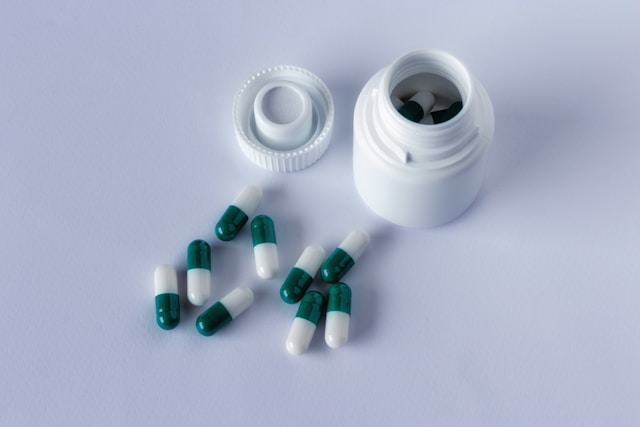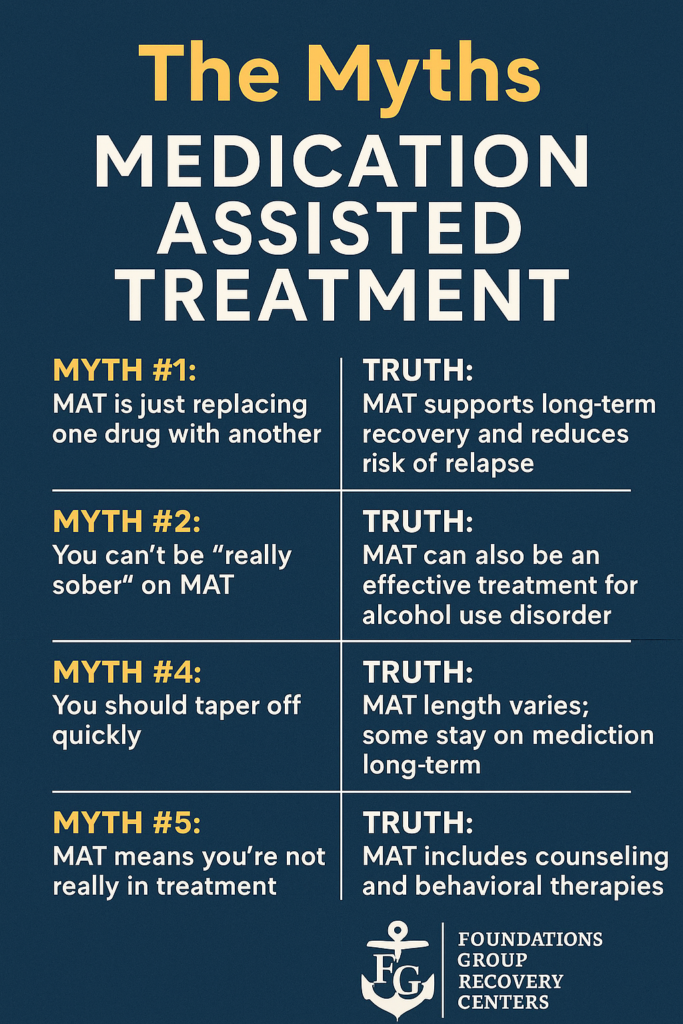When you’re holding it together on the outside—work, family, showing up every day—but battling a storm inside, the idea of “starting over” in recovery can feel both necessary and impossible. For many high-functioning individuals, Medication Assisted Treatment (MAT) offers a way forward without asking them to crash first.
But misinformation about MAT still runs deep. Maybe you’ve heard it’s “cheating,” or that you’re not really sober if you’re on medication. Maybe those messages are keeping you from considering a treatment that could give you your life back.
It’s time to clear the air. Here’s what MAT is—and what it absolutely is not.
Myth #1: MAT Is Just Replacing One Drug with Another
Truth:
This is one of the most persistent misunderstandings about Medication Assisted Treatment. The truth? MAT uses FDA-approved medications like buprenorphine, naltrexone, or methadone—not to get you high, but to stabilize your brain chemistry and reduce cravings. When taken as prescribed under medical supervision, these medications don’t produce a euphoric effect.
They give your nervous system the chance to reset. They give your mind enough quiet to think clearly. And they give your body the space to heal.
Using MAT is not about avoiding withdrawal at all costs—it’s about creating a foundation where deeper healing becomes possible.
Myth #2: You Can’t Be “Really Sober” on MAT
Truth:
Sobriety isn’t about suffering. It’s about stability, clarity, and connection. MAT can help make that possible—especially for people whose cravings and withdrawal symptoms have derailed past attempts at recovery.
Many people on MAT hold down jobs, parent their children, rebuild relationships, and show up for therapy every week. That is recovery. If a medication helps you stay grounded and engaged in your life, it’s not a shortcut—it’s a support.
In fact, numerous studies show that MAT significantly reduces the risk of relapse and overdose. That’s not a loophole. That’s progress.
Myth #3: MAT Is Only for Opioid Addiction
Truth:
While MAT is often associated with opioid use disorder, it’s also a recognized treatment for alcohol use disorder. Medications like naltrexone and acamprosate can reduce cravings and support long-term recovery from alcohol.
What matters is that your care team builds a plan around you—your history, your patterns, and your goals. At Foundations Group Recovery Center, MAT is always part of a broader treatment plan that includes therapy, education, and community.
Myth #4: You Should Taper Off Quickly
Truth:
There is no one-size-fits-all timeline for MAT. Some people taper off after a few months. Others stay on medication for years. Neither is “more right.”
What’s important is that your MAT plan supports your recovery—not anyone else’s opinion of it. We’ve worked with clients in Massachusetts who needed short-term support, and others who found stability in long-term medication management. It’s about what works, not what looks good on paper.
MAT isn’t about dependence. It’s about support. The goal is always the same: to help you feel safe, stable, and strong enough to live the life you want.
Myth #5: MAT Means You’re Not Really in Treatment
Truth:
If anything, MAT allows you to fully participate in treatment—by making it possible to attend groups, focus in therapy, and stay present through tough emotional work.
Recovery is about more than not using. It’s about building a life that feels worth staying for. MAT is a tool that helps many people get to that place faster and with less risk of relapse.
Foundations Group Recovery Center combines MAT with structured outpatient treatment that includes individual therapy, group support, and relapse prevention. MAT isn’t a replacement for treatment. It’s a powerful part of it.
A Local Resource for Medication Assisted Treatment in Massachusetts
At Foundations Group Recovery Center, our Medication Assisted Treatment programs in Massachusetts are designed to meet you where you are—with compassion, evidence-based care, and real options. Whether you’re considering MAT for the first time or want to revisit it after past attempts, we’ll work with you to build a path that fits.
Explore our Medication Assisted Treatment services in Massachusetts and learn how our team can support your next step forward.
Frequently Asked Questions About Medication Assisted Treatment
What medications are used in MAT?
Common medications include buprenorphine (Suboxone), methadone, and naltrexone (Vivitrol). These medications help reduce cravings and withdrawal symptoms.
Is MAT safe?
Yes, when prescribed and monitored by a medical professional. MAT is backed by decades of research and is considered a gold standard for treating opioid and alcohol use disorders.
Will I be on MAT forever?
Not necessarily. Some people taper off; others stay on long-term. Your treatment plan will be based on your needs and goals.
Can I work or drive while on MAT?
Yes. These medications are designed to help you function safely and effectively. Most people continue to work, parent, and live full lives while on MAT.
Does insurance cover MAT?
Many insurance plans do cover MAT as part of substance use treatment. Our admissions team can help you understand your benefits and options.
Ready to Talk It Through?
You don’t have to figure it all out alone. Call Foundations Group Recovery Center at (844) 763-4966 to talk confidentially with a counselor. We’re here to help you feel safe, supported, and clear about what comes next.


